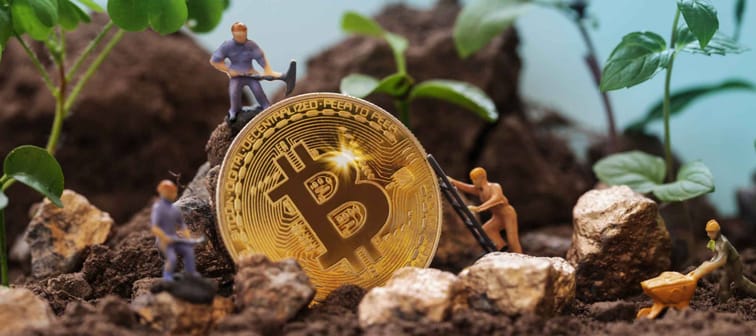What is bitcoin mining?
Bitcoin mining is the process of creating new Bitcoins by using powerful, industrial-strength computers on a vast network to solve incredibly complex computational equations that cannot be solved by the human mind. Every time an equation is solved by the computers, a new bitcoin is produced and enters circulation. The process is the same for every kind of cryptocurrency, not just bitcoin.
How does bitcoin mining work?
Not only does Bitcoin mining produce new coins as the reward for solving these complex equations, (every 10 minutes at minimum) but the act of mining also serves to verify the Bitcoin transactions as part of the ongoing, all-time Bitcoin ledger called the blockchain, which helps make transactions more secure.
Since the cryptographic equations get harder and take longer to solve for every Bitcoin produced, mining Bitcoin seriously takes stacks of specially designed computers using tons of electricity 24/7. Given the amount of computational power, this isn’t for the average person. The process takes days and is too expensive for most people to do. Once 21 million Bitcoins are in circulation, (there are over 18 million right now), the ceiling for Bitcoins will be reached and no new ones will be created.
Let’s take a closer look at how mining Bitcoin works in practice. Let’s say you buy an item with Bitcoin, that transaction must be verified by Bitcoin miners (or rather, their computers). Miners do this by checking the all transactions in the blockchain (the record of every verified Bitcoin transaction ever) to make sure you haven’t spent the same actual Bitcoins in a prior transactions, and then they verify that you actually have the amount of Bitcoin to make your purchase.
These two verification steps are done by solving a of the highly complex, cryptographic mathematical equations. Many miners around the world are trying to get the answer to the equation all at once, but the first one to do so, gets a newly minted Bitcoin for their effort. Think of it like a race solving incredibly difficult mathematical puzzles that only computers can find the answer to. Once 51 percent of the miners agree that the miner who solved the equation has the right answer, the transaction is verified and your item is purchased. Verification can take between 10 and 40 minutes with so many transactions now being processed in the world.
This is done for every transaction being added to the blockchain with a Bitcoin produced for each one until there are 21 million in circulation. But how many Bitcoins can a single minor earn?
How much can you make mining bitcoin?
In 2010, mining Bitcoin was pretty lucrative. Early hobby miners could earn 50 Bitcoin every 10 minutes just by mining from their own computers in their bedrooms. According to Buybitcoinworldwide.com, if you mined just one block in the blockchain and held onto it until 2020, you’d now have $450,000 USD worth of Bitcoin in your digital wallet.
These days, each miner who successfully solves an equation first by verifying a transaction gets 6.25 Bitcoins. It takes an average of 10 minutes to solve each equation and as of late June, this equates to approximately $250,00 CAD. This amount is then measured against what miners spend to do the actual mining. The special computational hardware needed to mine Bitcoin these days can cost somewhere between $5,500 and $10,000 each on average.
Meanwhile, the average cost of electricity in Canada is $179 per month (assuming an average usage of 1,000 kilowatt hours per month). Each Bitcoin transaction takes about 26 kwh, which is around what it takes to power an average North American household for 24 hours. There are an average of 302,150 Bitcoin transactions every week. One study by Power Compare shows that the average cost of electricity for mining one Bitcoin in Ontario is $15,609.20 CAD at a cost of 18.2 cents CAD per kwh.
Depending on the computational power of your combined mining hardware, known as the hashrate in cryptocurrency circles the average miner can earn between $1 and $42 a day. The greater the hashrate the better the chances of solving computational equations first and earning more Bitcoin.
Is mining bitcoin legal?
In most countries, including Canada, mining Bitcoin is perfectly legal. However, Bitcoin is highly regulated in Canada and most Canadian banks, including BMO, TD, Scotiabank, CIBC and RBC do not provide transaction services for buying or exchanging Bitcoins.
While Bitcoin is not considered legal tender in Canada, it is considered a commodity that can be bartered and any income that is made as part of a business, such as a Bitcoin mining operation, is considered business income and subject to the Income Tax Act of Canada.
The risks and rewards of bitcoin mining
While Bitcoin mining can be profitable, the cost-to-benefit ratio is very slim. The persistent danger is that a miner won’t make enough Bitcoin to cover what it costs to mine them.
However, if your mining hardware has a good hashrate and your energy costs are low, you may be able to turn a profit to the tune of $15,120 a year. It’s important to note that the value of Bitcoin is halved every 210,000 blocks in the blockchain. The next halving will be in Oct. 2024 with one transaction dropping from 6.25 to 3.125 Bitcoin.
How can you actually mine bitcoins?
Here’s how to begin mining Bitcoins in a few steps:
1. Set up a bitcoin wallet
Download an approved Bitcoin wallet. If you’re really serious you can buy a more secure hardware version such as Trezor or Ledger that isn’t connected to the internet so isn’t vulnerable to hackers. The Bitcoin wallet is where you will store your mined coins until you spend your cryptocurrency.
2. Calculate mining profitability
Use a mining profitability calculator like the one at Cryptocompare to calculate how much mining will cost relative to how much profit you think you can make. The more information you’re able to plug in, such as your electricity costs and the hashrate of your hardware, the more accurate your potential profit calculations will be.
3. Buy an ASIC miner and power supply
ASIC stands for Application-Specific Integrated Circuit and it’s basically a chip for running computations, a cooling fan and a backup generator. They vary in their efficiency based on their hashrate and how much power they consume. Some cheaper miners cost between $1,500 and $2,000 but may only produce $200 worth of Bitcoin a year. You often need more than one to create a worthwhile enterprise, as it could take seven to 10 years to become profitable, depending on the cost of electricity.
4. Connect your miner
Connect your miner to its power supply and then directly to your router using an ethernet cable. Copy and paste the IP address of your miner into your browser to configure it.
5. Download mining software to a networked computer
Two of the most popular mining programs are CGminer and BFGminer. For beginners, Easyminer might be simpler to use. Most mining software works on all major operating systems, but Easyminer isn’t avaialble on MacOS.
6. Join a mining pool
To compete with the massive Bitcoin mining businesses and their miner farms, it’s important to join a mining pool like Slush Pool. Otherwise, mining an actual Bitcoin could take years, not months. There’s no cost for joining a pool and combing your hashing power, but they will take a percentage of the Bitcoin recovered, usually 1 to 2 percent.
7. Adjust your miner to work with the mining pool
Once you’ve found a mining pool and set up an account, reconfigure your miner with the mining pool’s IP address and enter the username and password you created for the pool.
8. Transfer Earned Bitcoins to your Bitcoin Wallet
As you earn Bitcoin, your earnings will be recorded in your mining pool account. You’ll either transfer the Bitcoin into your digital wallet yourself or your pool will payout monthly. Some pools will only allow you to transfer after earning a certain amount.
What happens after you mine bitcoins?
If you’re mining fast enough to solve the proof-of-work equation first and earn a Bitcoin, the proceeds will be transferred to your digital wallet where you can spend them in Bitcoin or exchange them through a Bitcoin exchange for fiat currency.
So, should you mine bitcoin?
While mining Bitcoin can be lucrative, the chances of being the one to solve a computational equation before anyone else – and earn the 6.25 Bitcoin reward on a consistent enough basis to become wealthy or cover your mining costs – are pretty slim.
Mining pools can increase your chance at profit, but by the time you digitally unearth your first Bitcoin, the cost of mining could put you thousands of dollars in the hole.
FAQs
Is there any actual human labour involved in mining Bitcoin?
No. Bitcoin mining involves specialized computers that verify transactions with other computers in the network and guess the answer of a highly complex equation over and over again completely automatically. The computer that guesses the answer first, gets bitcoins for its operator. The only human labour involved is buying the hardware, hooking up the computers and setting up the network. Once that happens, a bitcoin mining operation can work 24/7 completely unattended, except for occasional troubleshooting.
When all the Bitcoins are in circulation, what happens to the miners?
Once 21 million Bitcoins are in circulation, no more new ones will be produced. However, miners will still be needed to verify transactions in the blockchain and their incentive for doing this won’t be Bitcoin, but the money they can earn through transaction fees.
Isn’t Bitcoin mining a waste of energy?
On the surface, it may seem like Bitcoin mining is a waste of energy. After all, the bitcoin network uses the energy output of 280,000 American households. However, Bitcoin has the potential to be part of an entirely new financial system, which could be very worth it in the end. Plus, it’s not like the current financial system doesn’t use energy on par with Bitcoin mining.






